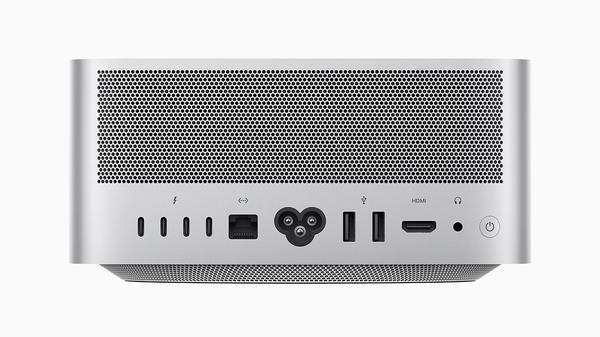Apple Mac Studio: A Monster for its Size
Last week, Apple unveiled an all-new Mac Studio, a compact yet powerful machine with its latest M1 Max chipset, along with a completely new M1 Ultra chipset. The Mac Studio would be a preferred choice of device for creative professionals with higher demands for performance, without consuming much space on the desk. Apple also unveiled its new Studio Display as a companion to their latest Mac Studio. Apple says that the new Mac Studio is the world’s most powerful personal computer while being compact in size and has plenty of connectivity options.
IMAGE: Apple
The new Mac Studio is available in two configurations, one with the M1 Max chipset we have already seen on the latest Macbooks. The second model comes with a brand-new M1 Ultra chipset, a fusion of two M1 Ultra chipsets on a single die. The M1 Max had already set its own league of benchmarks globally, which the M1 Ultra aims to take further ahead.
Table of Contents
What is Apple Mac Studio?
The Mac Studio is an advanced version of the Mac mini when considering the form factor. The Mac Studio has a similar shape as the Mac mini but is thicker to occupy a better cooling system. The primary aim of this machine is to meet the performance requirements of professionals in a compact package. The Mac Studio also comes with enough I/O ports, with an SD card slot on the front for added convenience.
How Powerful is the Mac Studio?
In both of its configurations with the M1 Max and the M1 Ultra, the Mac Studio already makes them the fastest computers by Apple. The M1 Ultra model comes with 114 billion transistors on board, the highest on any consumer chip in the world. In addition, this variant can play 18 streams of 8K ProRes videos simultaneously.
IMAGE: Apple
The M1 Max model of the Mac Studio has up to 64GB of memory, and the M1 Ultra offers memory up to 128GB. Both the models have storage options up to 8TB, powered by SSDs with speeds of over 7.8 Gbps.

The Mac Studio with M1 Max has 2.5 times faster CPU processing and 3.4 times faster GPU performance as compared to the 27-inch iMac. The M1 Max-powered Mac Studio is also 7.5 times faster than the same 27-inch iMac in video transcoding.
The M1 Ultra Mac Studio takes the performance metrics to a whole new level. It offers 3.8 faster CPU processing and 4.5 times better GPU performance in comparison to the 27-inch iMac. In addition, the M1 Ultra Mac Studio crushes the competition in video transcoding with 12 times better performance with the 27-inch Mac.
I/O Ports on the Mac Studio
IMAGE: Apple
The new Mac Studio’s compact design does not leave any compromises in I/O ports. Both the M1 Max and M1 Ultra models have the same number of ports, with the M1 Ultra supporting slightly higher speeds. In addition, this new machine can drive up to four Pro Display XDRs and a 4K TV simultaneously.
The Mac Studio comes with four Thunderbolt 4 ports, a 10Gb Ethernet port, two USB-A ports, an HDMI port, and a pro audio jack on the rear side. It also gets two USB-C ports and an SD card slot on the front side for ease of access. These front-sided USB-C ports support 10Gbps USB 3 on the M1 Max model and 40Gbps Thunderbolt 4 on the M1 Ultra model.
The new Mac Studio also includes WiFi 6 and Bluetooth 5 for wireless connectivity.
What Makes the Mac Studio So Special?
IMAGE: Apple
The Mac Studio is the only Apple machine that comes with the M1 Ultra chipset, which is the fastest chipset Apple has ever produced. The Mac Studio manages to pack this in a very compact form factor with a maximum thickness of just 3.7-inches. Even after this, the machine does not make compromises on I/O ports, so users will not have to use dongles to connect accessories to their computer.
As the name says ‘Mac Studio’, the Mac Studio is a perfect fit for studios of creative professionals in the field of 3D rendering, Videography, Simulation, and much more. The Mac Studio comes with endless capabilities without occupying humongous space on your desk.
Studio Display – New But Not New
IMAGE: Apple
Apple also announced the Studio Display as a perfect pair with the Mac Studio. It is a 27-inch 5K Retina screen with wide P3 color. The display can get as bright as up to 600 nits. The Studio Display also supports Apple True Tone Technology for the best color output.
The Studio Display is powered by Apple’s A13 Bionic chipset, making it self-sufficient for the majority of its tasks in color and audio processing. It also comes with a 12MP ultrawide camera and Center Stage support. In addition, the Studio Display gets a triple microphone array with a six-speaker sound system for the best studio audio.
If that all sounds familiar, then this is because the Studio Display is just the regular 27-inch iMac, with the M1 chipset swapped out for the Apple A13 Bionic chipset. It’s the same body, the same aluminum frame, with the same 30-degree tilt stand, with support for a VESA mount.
This also means that the Studio Display supports speeds of up to 10Gbps on its three USB-C ports, which can be used in addition to the ports on your Mac Studio. It also comes with a Thunderbolt port that can deliver over 96W of power, so you can fast charge your Macbook or even your iPhone using this display.
Apple Mac Studio and Studio Display – Price
Prices for the Mac Studio in both configurations start at








